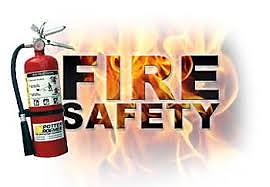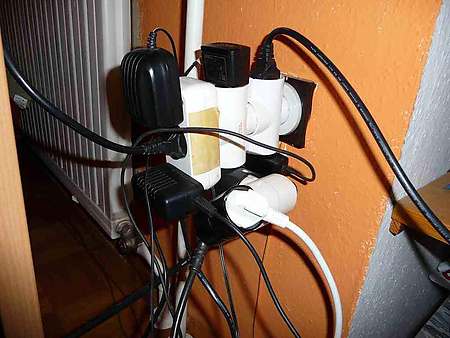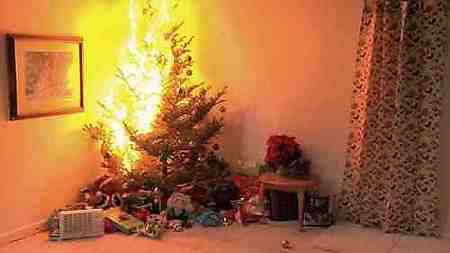Help & Advice24th November 2015
Over 19 Million Homes at Risk of Fire this Christmas
With the American-like trend for Christmas lighting expanding, it's important to know how to do it safely
 A new report has revealed that over three quarters of complacent Brits are leaving their homes at risk of electrical fault and potential fire at Christmas.
A new report has revealed that over three quarters of complacent Brits are leaving their homes at risk of electrical fault and potential fire at Christmas.
- 9 in 10 UK homes will be decorated this Christmas
- 4 in 5 Brits admit to going ‘over the top’ with their lights and decorations
- Nearly half (49%) of homeowners have never had their home electrics checked or do not know when their electrics were last checked
 New research, commissioned by the UK’s leading regulatory body for electricians NICEIC and ELECSA has revealed some disturbing facts about the safety of UK homes at Christmas. As 90 percent of Brits admit to decorating their home and garden in the next few weeks, less than a quarter (23 percent) would consider the impact this might have on the electrics in their home. The study, which surveyed 2,000 UK tenants and homeowners, found that 42 percent of Brits paid more attention to aesthetics than safety, with 1 in 5 admitting to feeling they needed to compete with their friends and neighbours
New research, commissioned by the UK’s leading regulatory body for electricians NICEIC and ELECSA has revealed some disturbing facts about the safety of UK homes at Christmas. As 90 percent of Brits admit to decorating their home and garden in the next few weeks, less than a quarter (23 percent) would consider the impact this might have on the electrics in their home. The study, which surveyed 2,000 UK tenants and homeowners, found that 42 percent of Brits paid more attention to aesthetics than safety, with 1 in 5 admitting to feeling they needed to compete with their friends and neighbours

Inevitably, the increase in decorative lights require the use of multiple sockets and extension leads, yet less than 3 percent were concerned about the amount of lights they were using and whether they could be of danger to their family.
 “Electrical safety in the home is important at any time of the year, but at Christmas we tend to forget that all the decorative lights we use around the home massively increase the dangers to our family. Just grabbing old lights from the loft and plugging them in isn’t acceptable. Everyone needs to be aware of the dangers and take into account the risks when getting competitive with the neighbours.” explains Tony Cable, Senior Electrical Engineer for NICEIC and ELECSA.
“Electrical safety in the home is important at any time of the year, but at Christmas we tend to forget that all the decorative lights we use around the home massively increase the dangers to our family. Just grabbing old lights from the loft and plugging them in isn’t acceptable. Everyone needs to be aware of the dangers and take into account the risks when getting competitive with the neighbours.” explains Tony Cable, Senior Electrical Engineer for NICEIC and ELECSA.
Further causes for concern include the repeated use of lights year on year that are not properly checked (57 percent), lights used for 5 years or more (30 percent) and Brits not understanding the British Safety Kitemark (47 percent).
 Vicente McNeill, an electrician from London explains “The most common problem that occurs at Christmas, is over-loading due to people plugging in too many lights from their garden. In my opinion, homeowners are not aware of the strain they are putting on their home systems.”
Vicente McNeill, an electrician from London explains “The most common problem that occurs at Christmas, is over-loading due to people plugging in too many lights from their garden. In my opinion, homeowners are not aware of the strain they are putting on their home systems.”
Brits are advised to think safety first when decorating their home this Christmas. NICEIC and ELECSA have identified the top five tips to ensure your home is electrically safe this Christmas;
1. Do not overload sockets – Try to avoid extensive use of extension sockets and adapters. Do not plug multiple extensions into each other.
2. Do not re-wire your lights – Many homeowners will be tempted, or have already rewired lights to include 2, 3 or sometimes 4 sets of lights into a single plug. This is dangerous and causes a potential fire risk.
3. Make sure lights you use outside are certified safe for external use - Only use outdoor lights that have been specifically designed to be used outdoors. If you are unsure check the manufacturers’ instructions.
4. Do not leave lights on for long periods – Many homeowners will be tempted to keep lights on for 24 hours, overnight or even more concerning, leave them on when they go out. All Christmas lights increase the risk of fire and overloading and should only be switched on whilst you are at home.
5. Always use Christmas lights that have been certified for use – This can be identified by the European Standards Symbol (represented by a CE) and the British Standards Kitemark. If in doubt, don’t use them. Always buy lights from reputable stores.
 Faulty electrics in the home account for 20,000 house fires each year, causing upwards of 70 fatalities. Most electrical issues in the home are easily preventable by ensuring your home is regularly checked by a suitable, registered electrician.
Faulty electrics in the home account for 20,000 house fires each year, causing upwards of 70 fatalities. Most electrical issues in the home are easily preventable by ensuring your home is regularly checked by a suitable, registered electrician.
If anyone is concerned about the safety of their home electrics, or would like to obtain professional advice about their Christmas lights, they can visit www.niceic.com/safechristmas or www.elecsa.co.uk/safechristmas to find the latest advice and tips and to find a registered electrician.
Article by SLFirst Team
posted in Community / Help & Advice
24th November 2015





